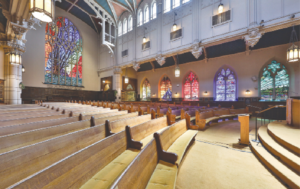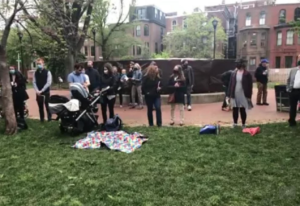As more and more people become vaccinated against COVID-19, communities are grappling with what the next phase of reopenings will look like.

While some synagogues have been open for indoor worship throughout the pandemic, often with masks and distancing, synagogues that have relied on virtual or outdoor programming now face an important question: Is it time to get back in the sanctuary?
Rabbi Jill Maderer of Congregation Rodeph Shalom said that while news of the vaccine rollout was encouraging, Rodeph Shalom would not be returning to large indoor maskless gatherings without widespread vaccine availability for children and enough herd immunity in the city, state and even country to make the virus a very low risk.
“One of the strengths of the congregation is the diversity, including age,” she said. “We have this entire youth community who is behind in vaccinations, so we’re eager for that to be offered.”
Until these conditions are met, the synagogue is experimenting with incremental and slow returns from virtual worship to gathering outdoors and in small groups.
Rabbi Eric Yanoff of Adath Israel said his community has been using outdoor events, including a Passover barbecue and upcoming Shavuot celebration, to get people used to the idea of gathering in person again.
“People are going to come around to it at different times, going back to the habit of coming to shul,” he said.
He said the last few months made a massive difference in people’s confidence levels in terms of socializing, but getting back to a pre-pandemic normal of indoor worship will be a long process.

Rabbi Abe Friedman of Temple Beth Zion-Beth Israel said small in-person b’nei mitzvah ceremonies and in-person preschool programming held over the past year have given synagogue leadership an opportunity to learn more about what kind of indoor programming is possible.
He said the synagogue plans to begin to bring people together more over the summer to test procedures and plan for the fall. Services held in the sanctuary will be kept small. People will be required to RSVP, and no kiddush will be served.
Friedman said the synagogue highly encourages vaccines, but would not require people to provide proof of vaccination since indoor gatherings will involve masking and distancing, measures that have proven efficacy against the virus. He also said that requiring the vaccine would be unfair for people who could not yet access it due to medical conditions, income issues or inability to take time off from work.
Rabbanit Dasi Fruchter of the South Philadelphia Shtiebel said her shul plans to continue to congregate outside with masks, which has been the practice since the pandemic began. As more and more people are vaccinated, they will adjust their guidelines for services and celebrations.
She pointed out that moving gatherings indoors would come with many more restrictions than outdoor gatherings and could feel jarring to congregants. Now that fully vaccinated people can forgo a mask outdoors if they are able to keep social distance, outdoor gatherings feel much more relaxed.
“A big question we’re holding now is, well, is it worth it to move inside if we have the opportunity outside for less restriction?” she said.
But the truly big question on synagogue leadership’s minds is the procedure for the High Holidays.
“I frankly expect that a quarter-to-a-third of our congregation is probably going to prefer to stay online, either because of concerns about corona, or because the experience for them online is actually better,” Friedman said. “We have a very old building. Accessibility is a problem. There are people who have all kinds of hearing impairments, and being able to control the level of sound with themselves, is a major improvement of experience.”
Maderer said Rodeph Shalom is evaluating scenarios for how to conduct services in the sanctuary for the High Holidays. The congregation hopes to hold services indoors, but Maderer acknowledged they may operate at limited capacity.
Yanoff also does not anticipate Adath Israel will be back to pre-pandemic normal in terms of capacity or relaxing safety restrictions by fall.
“We don’t think it’s likely, based on a survey that we did in our community. People are not likely to feel comfortable being in a room with 1,500 other people for full-length services,” he said. “We are planning on doing multiple breakout services with smaller capacities that allow for distancing.”
Adath Israel, Rodeph Shalom and BZBI plan to continue offering virtual services for the foreseeable future for those who do not feel comfortable returning to in-person services, as well as for members with disabilities, child care issues and other accessibility concerns.
“We’ve actually used this time while we have not been in the building this year to rewire and to increase and improve our infrastructure so that we can continue to reach people who are not in the building,” Maderer said.
The South Philadelphia Shtiebel does not stream services but will continue to offer online classes.
Although Fruchter described her shul’s approach to safety as slightly more cautious than the Centers for Disease Control and Prevention, she believes Jewish leaders and shuls have a responsibility to help people overcome their anxieties and get used to the idea of moving back toward normal social interactions. That could mean giving people the opportunity to join services from longer distances away or simply providing a sympathetic ear.
“There’s another role that we play in helping people feel safe, together, and providing that reassurance,” she said. “It looks like compassionate listening. The fear is so real.”
[email protected]; 215-832-0729



